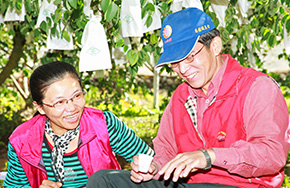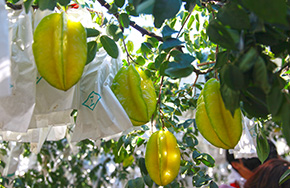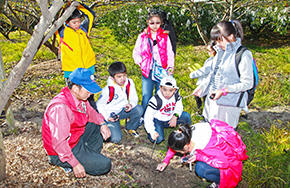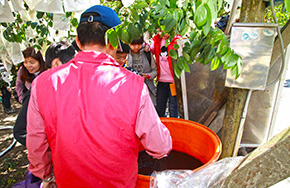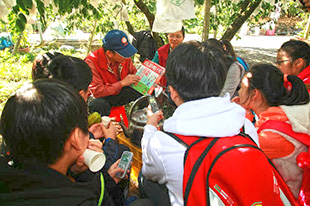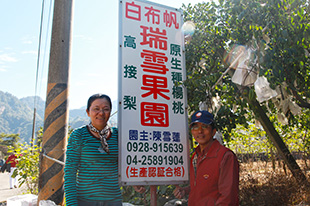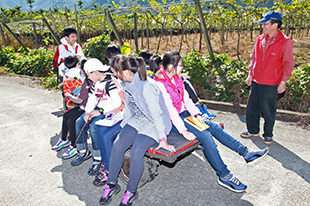| Fruit Masters |
(Tsai-chen) |
Introduction
Red on Tree is a company that insists on local, toxic-free or organic ingredients. It uses local fruits to produce hand-made jam. Through its efforts, local fruits are endowed with new economic value, and their original taste can be presented in different ways. Our team is curious about what are the differences between the orchards selected by Red on Tree and other orchards, thus, we visited four orchards that produce toxic-free star fruit, strawberry, guava, and fig. Through face-to-face interview with the farmers, we realized their hardship in planting fruits, and their enthusiasm toward this land. We hope that more people can experience the vitality of Taiwan through the work of the farmers and their fruits.
| |
| |
|
|
|
|
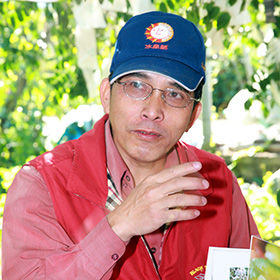 |
|
| |
Jui-sung Chang
Education
- Department Public Management and Policy, Tunghai University
Experiences
- Chief, Personnel Office, Taitung County Government
- Director, Personnel Office, National Jhuo-Lan Experimental Senior High School
- Director, Personnel Office, National Feng-yuan senior High School
Currently
- Director, Personnel Office, National Yuanli Senior High School
- Weekend farmer
|
|
| |
|
|
| |
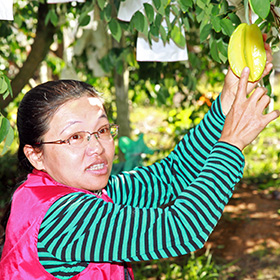 |
|
| |
Hsueh-lien Chen
Education
Experiences
- Director, Baibufan Fruits Marketing Cooperative
Currently
- Owner, Rui Hsueh Orchard
- Executive Secretary, Baibufan Community Recreational Industry Development Association
- Deputy Director, Miaoli County Cholan Township Qingsi Women’s Association
|
|
| |
|
|
| |
1) Rui Hsueh Star Fruit Orchard
Location: Rui Hsueh Star Fruit Orchard
Time: December 1, 2013
Q1. Why did you want to cooperate with Red on Tree? (Yin-cheng)
A1. At that time, Red on Tree found that we plant local variety of star fruit, and our management is considerate and attentive. After they visited our orchard, they decided to cooperate with us.
Q2. Why do you only plant star fruit? (Tsung-chun)
A2. Our star fruit trees are more than 30 years old. They were planted in my parents’ generation, and passed through the family. Besides, the climate, geography, and water condition, as well as special black sandy soil in this region are suitable for star fruit planting.
Q3. Why are those star fruit trees so short? (Yin-cheng)
A3. Most star fruit trees are tall and strong. We grow soft-branch star fruit trees, thus the trees can grow along pergola. Soft-branch star fruits are easy to harvest and bag. After the star fruits ripe, they will become heavy, and bend down the branch to the height of an adult which is quite convenient for farmers to take care of the fruits.
Q4. Does the star fruit have any by-products? (Jie-sheng)
A4. The processed products include star fruit enzyme, dried star fruit, star fruit jam, and star fruit juice. The star fruit jam and star fruit drops sold by Red on Tree are high-end processed products. Most star fruits are sold as fresh fruits, thus few are made into processed products.
Q5. What is the biggest difficulty in the process of planting fruits? (Tsung-chun)
A5. The fruits we plant are not completely organic. We strive to be organic, but it is hard to prohibit any chemical fertilizer or pesticide. We try to use less and safer pesticide. For fertilizer, we use organic fertilizer such as peanut shell, bagasse, and bean cake, as well as very little chemical fertilizer. So, the fruits have good taste.
Q6. Besides using peanut shell and bagasse, are there any other fertilizers? (Jie-sheng)
A6. We make our own liquid fertilizer using organic bacterium, which includes sea-weed powder, milk, bacterium, and fructose mixed together and fermented for 3 months. After concentration and fermentation, it must be diluted before use. We spray the liquid fertilizer on the leaves and soil for trees to absorb the nutrients. This liquid fertilizer is completely organic without any chemical fertilizer.
Q7. To your opinion, what is the biggest value of organic fruit? (Yin-cheng)
A7. The truly organic and toxic-free fruits are safe to eat, and people can maintain healthy after eating. If the fruit is toxic or sprinkled with excessive pesticide, it will be harmful to human body. Therefore, we sell toxic-free fruits for people to enjoy safe and healthy food!
Q8. The price of organic fruits is generally more expensive than regular fruits, so that people may doubt the values. How do you feel about that? (Hui-yu)
A8. Our fruits are not completely organic; if necessary, we will sprinkle little pesticide. Growing toxic-free fruits require more efforts. We used to be doubted if organic fruits really better or not. If people did not buy, we would not have income which is upsetting. Now, we have good word of mouth, so do not face such situation anymore.
Q9. In case of natural disaster, what measures will you take to reduce the loss of fruits? (Hui-yu)
A9. In case of typhoon or rainy days, we use support to settle the star fruit and pears, and cover the grape trellis to minimize the damages.
Q10. What subsidies does the Taiwanese government provide to orchards? (Tsung-chun)
A10. The Taiwanese government provides a wide range of subsidies to orchards. For bagasse fertilizer, the cost per bag is 100 NTD, and the government subsidizes 10 NTD. There are also subsidies for sprinkler systems, concrete pavement for the gravel road in front of the farmland, pesticide, paper box and carton for packaging, and wind damage loss. As long as the government has annual budget, we can apply and receive subsidies.
Q11. The star fruit orchard is your life’s work, what is your expectation for it? (Yin-cheng)
A11. I am the second generation orchard owner, but now operate it as a recreational farm. Our main focus is to make a living, and provide a place for friends, family, and visitors to enjoy the nature. I hope that we can cultivate organic and toxic-free fruits, but all the purely organic fruits have insect damage. Thus, we use a little pesticide and organic fertilizer as much as possible which we insist very much. The government has included the education on local agricultural products in elementary school curriculum. I also tell my consumers about our concept to accept local agricultural products. In terms of internationalization, in 1980s, our products were exported to Singapore and Canada. However, the star fruit cannot bear long-distance transportation, so they were harvested before ripe. The unripe fruits do not taste well, so that in the U.S., star fruits are used for mixing drinks or decoration only.
| |
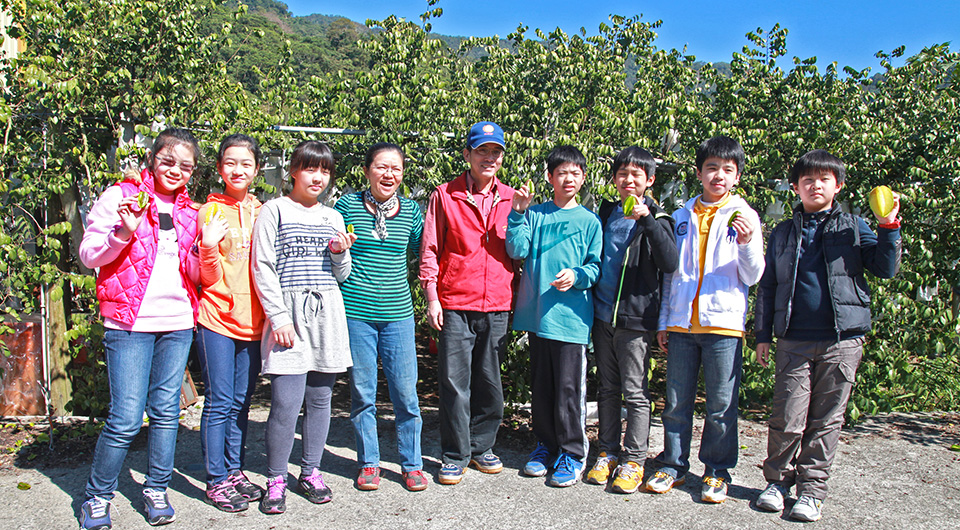 |
|








